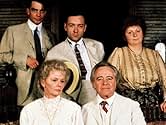The difference between this production of Long Day's Journey Into Night and the 1962 version is the difference between a filmed stage play and a movie. The 1962 film was an incredible work, one of the best adapted stage plays to film ever.
One big part of the play is the obsession of James Tyrone into making a grand estate as would befit a celebrated matinée idol of the stage. With the action taking place in the Tyrone living room in the play you have to depend on the players to envision this edifice that Tyrone is trying to create. In the 1962 film the dialog moves in and out and around the grounds of the estate and the film was shot in a mansion that still stands on the Connecticut ocean shore and is an attraction today. The house becomes a character unto itself and therefore the 1962 film has dimensions that cannot be realized here.
Playing the wildly dysfunctional Tyrone family is Jack Lemmon and Bethel Leslie and their sons, Kevin Spacey and Peter Gallagher. O'Neill takes us back to a moment in time in 1912 as his alter ego Peter Gallagher is sick with tuberculosis, but knowing he has a gift to give the world and worrying whether he will live long enough to give it. It's through his eyes we see the events unfold.
O'Neill plays are long and deep on characterization if short on action. But the characters linger with you forever. Jack Lemmon is the patriarch, a former matinée idol as O'Neill's father was, grown famous for playing a pulp version of The Count Of Monte Cristo a gazillion times. Like someone in a long running television series, he became a victim of typecasting and the public wouldn't see him in anything else. But the role made him prosperous, but intellectually stifled.
Watching Lemmon he must have studied Ralph Richardson's 1962 performance so much that pieces of Richardson kept creeping into his mouth. At times he was almost imitating him. Still Jack Lemmon is a good enough actor to create his own Tyrone.
That will not be said about Bethel Leslie whose health is everyone's concern and what the family revolves around. She doesn't sound the least like Katharine Hepburn. During the difficult birth of her second son who grew up to be Peter Gallagher, she was prescribed narcotics for the pain and grew to like it too much. As she married well, her addiction kept her from being a police problem or a dreg on whatever meager social services existed in 1912. It's not clear what started her on this, but my guess would be laudanum, an opium derivative and prescribed by a lot of quack doctors and even some good ones who didn't know at the time what the long term effects were. Leslie is as riveting as Katharine Hepburn was.
Ditto for Kevin Spacey who stepped into the giant shoes of Jason Robards who was considered to be the premier interpreter of the works of Eugene O'Neill in his time. The older son carried the father's hopes and dreams of succeeding him as a stage actor of renown, but his love of the nightlife of Broadway overtook him. That final drunken scene with his father and brother where he just totally loses it is Spacey reaching incredible dimensions.
Gallagher takes it all in and he will survive despite a father who won't send him to a proper sanitarium for a cure because he's cheap, despite a mother who clings to him, despite a brother who can't reconcile love, hate, and jealousy that he has all at the same time. He did survive and gave us some of the best work in American literature.
And this is a fine production of one of the best works of American literature.




















